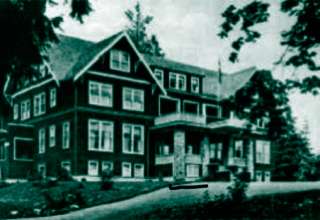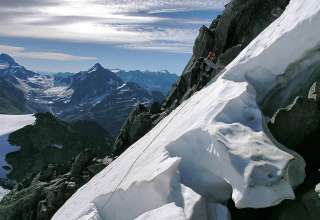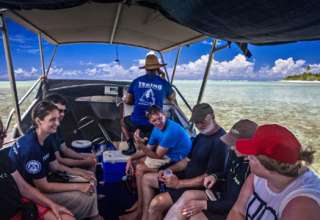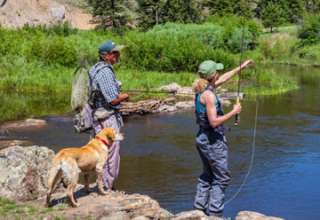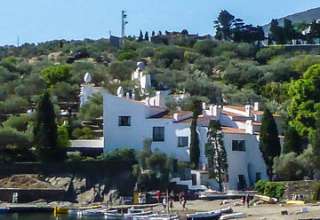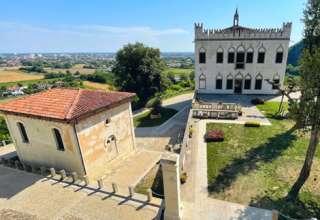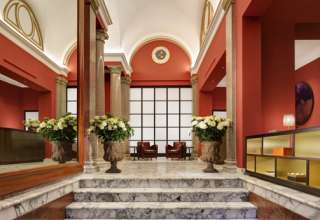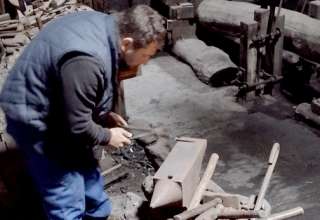YELLOWKNIFE, Canada – Ranking Blachford Lake Lodge has never been easy. Creative, rustic, “one man’s folly,” and gold-star luxury are just a few of the adjectives that befuddled lodging associations have applied to this remarkable eco-lodge, deep in the heart of Canada’s Northwest Territories. And it’s that last adjective – luxury – that misses the mark.
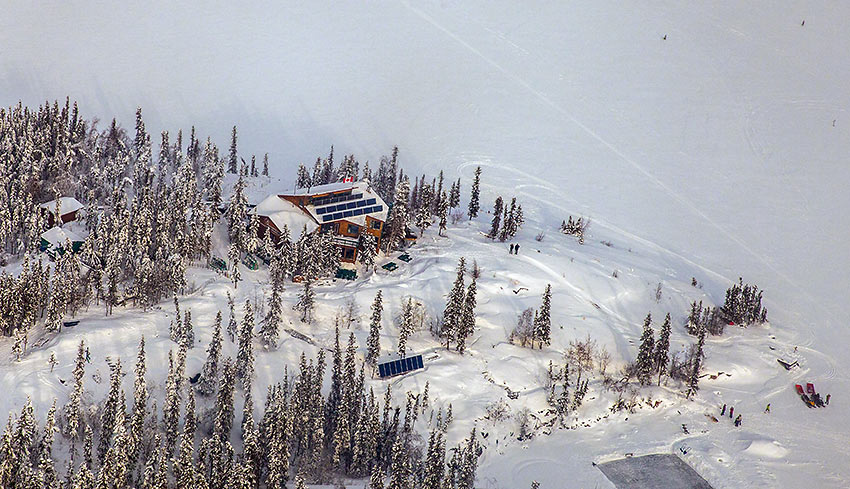
Yet it’s just how repeat guests – travelers who’ve drunk the Kool-Aid – describe this deliciously inviting hilltop oasis. Just not London-style luxury, according to English artist Diana Pullman, on her second day at the lodge. “The difference is we’re in the wilderness here, off the grid,” she said, knocking the snow off her boots. “Log lodges don’t need Persian rugs and gold-framed paintings to be special,” she pointed out, curling up next to the wood stove where we were drying our socks.
“Just look at these timbers, they’re classic log cabin,” she said, gesturing at the peeled massive beams, the unfinished pine paneling and the plywood floors, painted an unobtrusive dark-maroon. ”The open-space design, high ceilings, big windows, light from all angles. It’s traditional and contemporary. Get the basics right – great food and good beds – and you don’t need frills.”
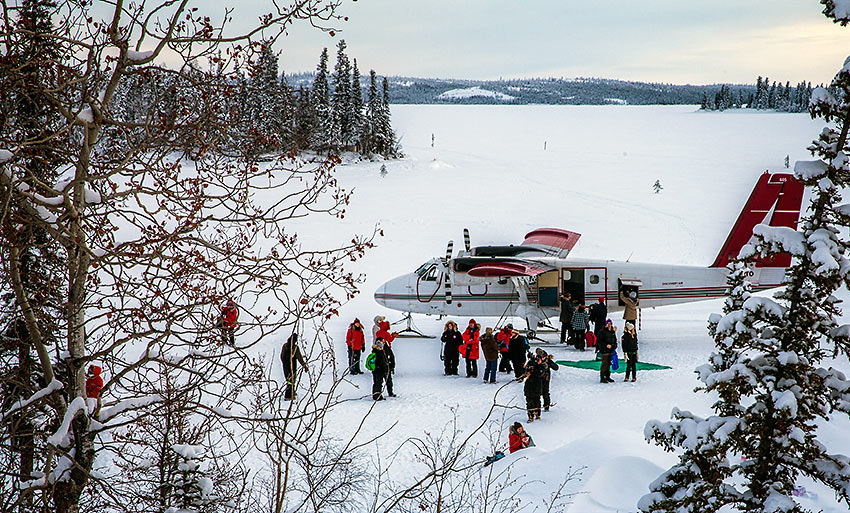
Flying on a ski-plane from Yellowknife and landing on the frozen lake, we were greeted by a snowmobiler hauling a sled. Beyond him came the welcome committee, a half-dozen smiling Gen Y guides swaddled in thick jackets and wool hats, young adults who bustled about, sorting the luggage and checking our names off a list.
Volunteers hired for two-month stints from a half-dozen foreign countries, they were as eager as we were to be there, experiencing a true sub-arctic winter. They weren’t what I expected, but it was impossible to ignore their enthusiasm, as they escorted us up the hill, talking all the way. “Here, let me carry your backpack,” said Adrian Allen from Australia, pointing out the skating rink in the cove below, the circular hilltop trails and the Nordic skis and poles stacked on the rack near the front door. “It’s this way to the teepee, around the back, and that way to the sauna,” said Maude Bergeron-Lambert, from Quebec who was waiting on the hilltop, ready with a brief orientation. “Your room is the big one upstairs, where Kate and Will, the “royals,” stayed when they were here,” she said, giggling.
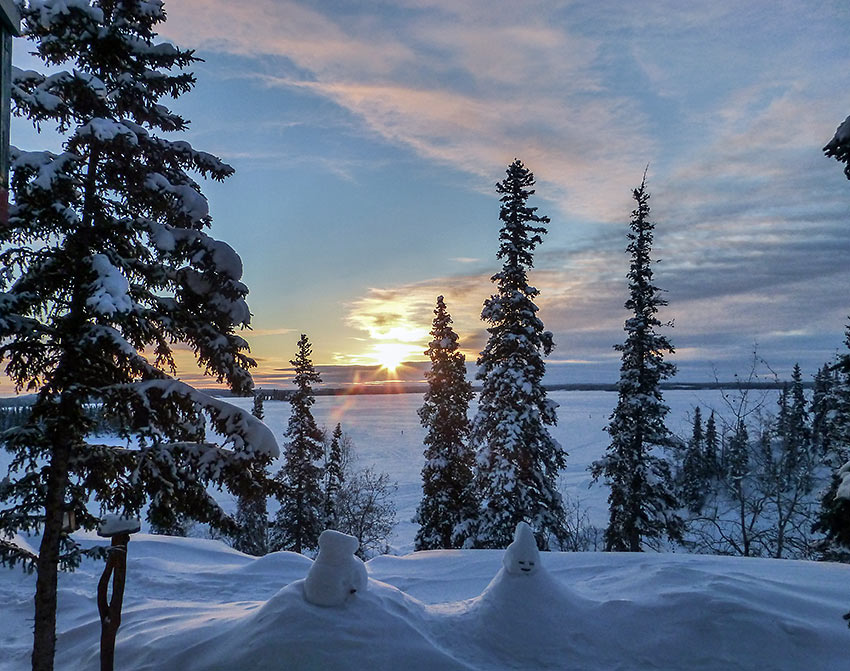
Looking back to the lake below, where our transportation – an uninsulated Twin Otter with fold down seats – picked up speed, lifted off and disappeared over the endless forest, I suddenly felt alone. The fact that the rarely-visited Northwest Territories (one of Canada’s three northern territories) contain 520,000 square-miles of mountains, lakes and canyons, twice the size of Texas, was just as sobering. It didn’t take the 28 of us guests very long to introduce themselves.
Ray, in the room down the hall, compared it to the speed with which he made friends as a twelve-year- old at summer camp. As for me, this four-day getaway felt like a country house party of yore – think Downton Abbey – with the duke’s good friends gathering for fresh air, bird shooting, trout fishing and candlelit dinners.
There were differences, of course. Candles were thin on the ground and there were no silk draperies, crystal chandeliers or marble-tiled bathrooms. Also absent were mini-bars and television along with 24-hour room service, air conditioning and intermittent Internet access.
With no roads, no cars and no traffic, the only sound was the wind; the only essentials, the fresh air, the trees and the lake. With stacks of equipment available at no charge – Nordic skis, snowshoes, ice skates and hockey sticks – and a hole in the ice for fishing, there was no reason to stay indoors.
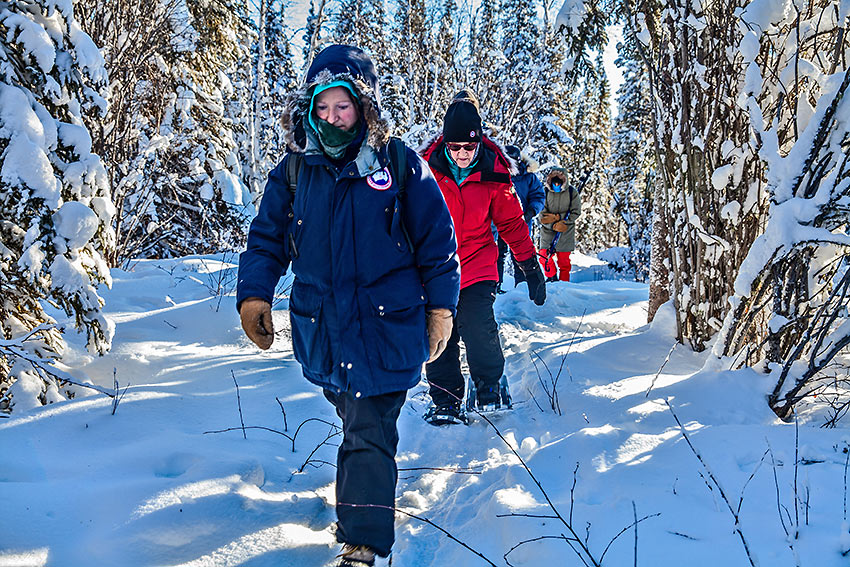
The most popular sport was snowshoeing, usually on signed trails. These began at the lodge and looped away over the hilltop, through the trees, over a creek or two, beside the meadows and back. Clumping around on what Allen called “homemade tennis rackets” was not just easy, but fun. And, plenty of comic relief every time somebody toppled over into a snowbank. Hockey fans put on skates and headed to the pond (a small bay where kayaks dock in the summer). Alpine (downhill) skiers who’d never tried cross country skiing – and were confident they had the right stuff – went down to the lake where the staff, using a snowmobile and roller, had laid down a couple of miles of looping, groomed tracks. The longest track headed straight down the lake for a mile, circled a small island and returned on the far side, requiring swooping strides that quickly revealed unknown muscles. A shorter track curved in and out of the adjacent coves, a bonus for multi-tasking photographers.
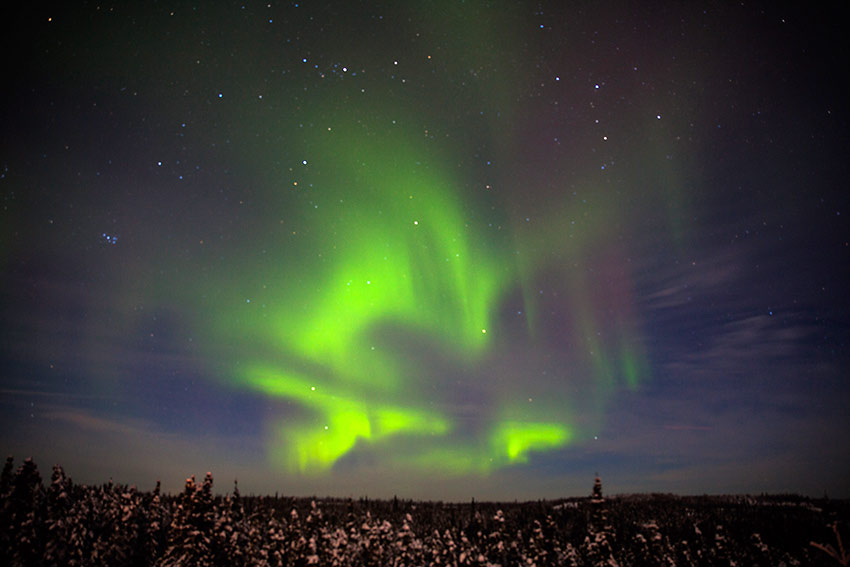
Not everything depended on aerobics. We joined the igloo building session, a chance to prove you were handy with a saw, able to cut blocks from hard snow and remembered enough geometry to angle the edges needed to make the dome. And there was the hot-tub escape, a sauna, and the marshmallow-roast on a campfire in the teepee, located on a north-facing ridge. It was here, facing north at night, that everyone gathered to watch the aurora borealis, a ghostly ribbon of green rising over the horizon. Shape-shifting, it hung in the sky, then slowly faded. Though sightings are never guaranteed, Blachford Lake Lodge’s unique location close to the magnetic north pole, makes viewing likely.
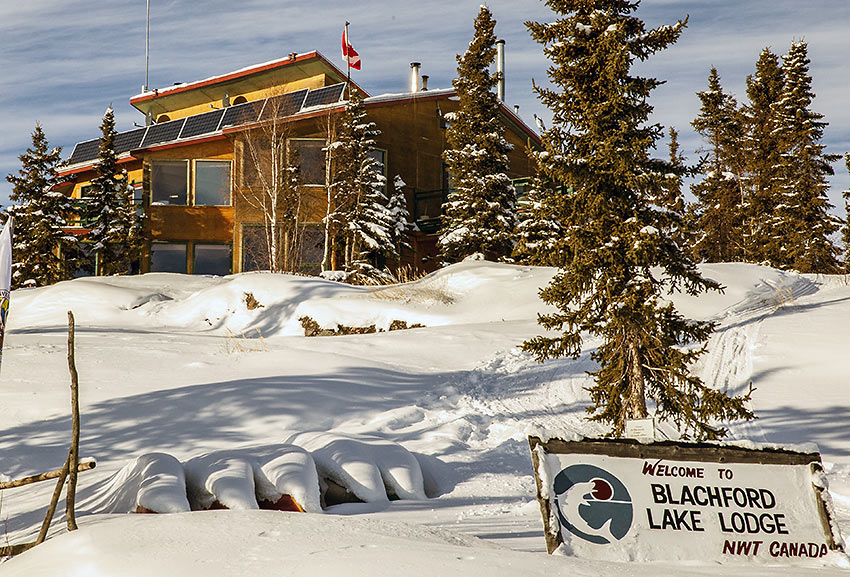
Though mostly invisible to guests, the biggest challenge for “off the grid” lodges like Blachford Lake Lodge, is providing the essentials: electric power, water and heat, said Sarah Van Stiphout, the general manager and one of four employees on hand (others are based in Yellowknife). “When owner Mike Freeland bought the property in 1981, it had one small cabin – now restored and named Old Trapper’s Cabin – and nothing else,” she told me. “No electricity, gas, water, lights, nothing. Friends who came out to visit brought their camping gear.”
Thirty-odd years later, environmental technology has produced an eco-sustainable model that would work anywhere. Here, completely alone, you can read by the lights in your room. You can charge batteries, drink the water, flush the toilet, take a hot shower and stay warm in your shirtsleeves. You can even ask Chef Carla to bake bread and make a blender-whipped smoothie.
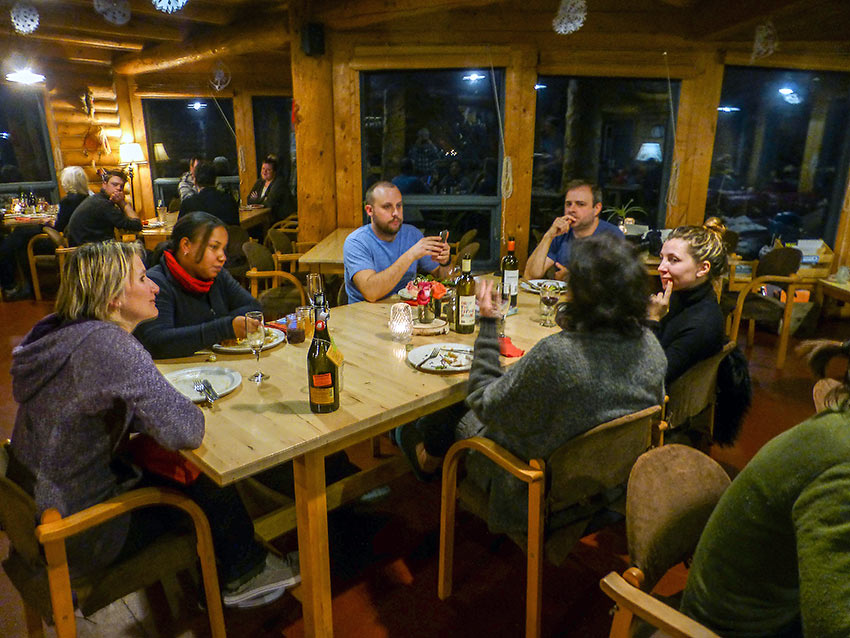
Four sets of roof-top solar panels get a boost from a single wind turbine connected to five sets of batteries. With a backup diesel generator, the system produces more power and heat than the lodge needs or uses, even in the coldest winters. The water for brushing teeth is drinkable, filtered on-site by a plant that also turns waste water to grey water for use in gardens and shrubbery. And a waterless process installed below the main floor converts solid waste to compost. The “contemporary” open spaces that Pullman admired circulate warm air, creating cozy nooks and a spacious living room, a single space for the bar, tables, sofas, the library and the open-counter kitchen, proof that wilderness and luxury can go hand in hand.
Chance are, it won’t be long before you, too, are drinking the Kool-aid.
IF YOU GO: The lodge is open in summer and in winter, that is, whenever the plane can land (on solid ice or open water). Five lodge rooms and five separate cabins are outfitted to sleep four or more, in king, queen and/or bunk beds. Child rates depend on the season and date. All meals are included, served buffet style; two chefs prepare everything on site, from breads to salads and main dishes. Summer activities include kayaking, canoeing, swimming, hiking and badminton. Commercial flights land in Yellowknife, in Canada’s Northwest Territories, to connect with the lodge-operated charter flight. For all information, including reservations and transportation, visit Blachford Lake Lodge.
Writer Anne Z. Cooke, a regular contributor to most big-city Sunday newspaper travel sections and websites, visits the Arctic as often as possible. A former luxury-lodging columnist and a Huff Post blogger, she talks to readers at
tr*************@cs.com
, and on twitter at @anneontheroad..
©The Syndicator2018/19, Anne Z. Cooke.

